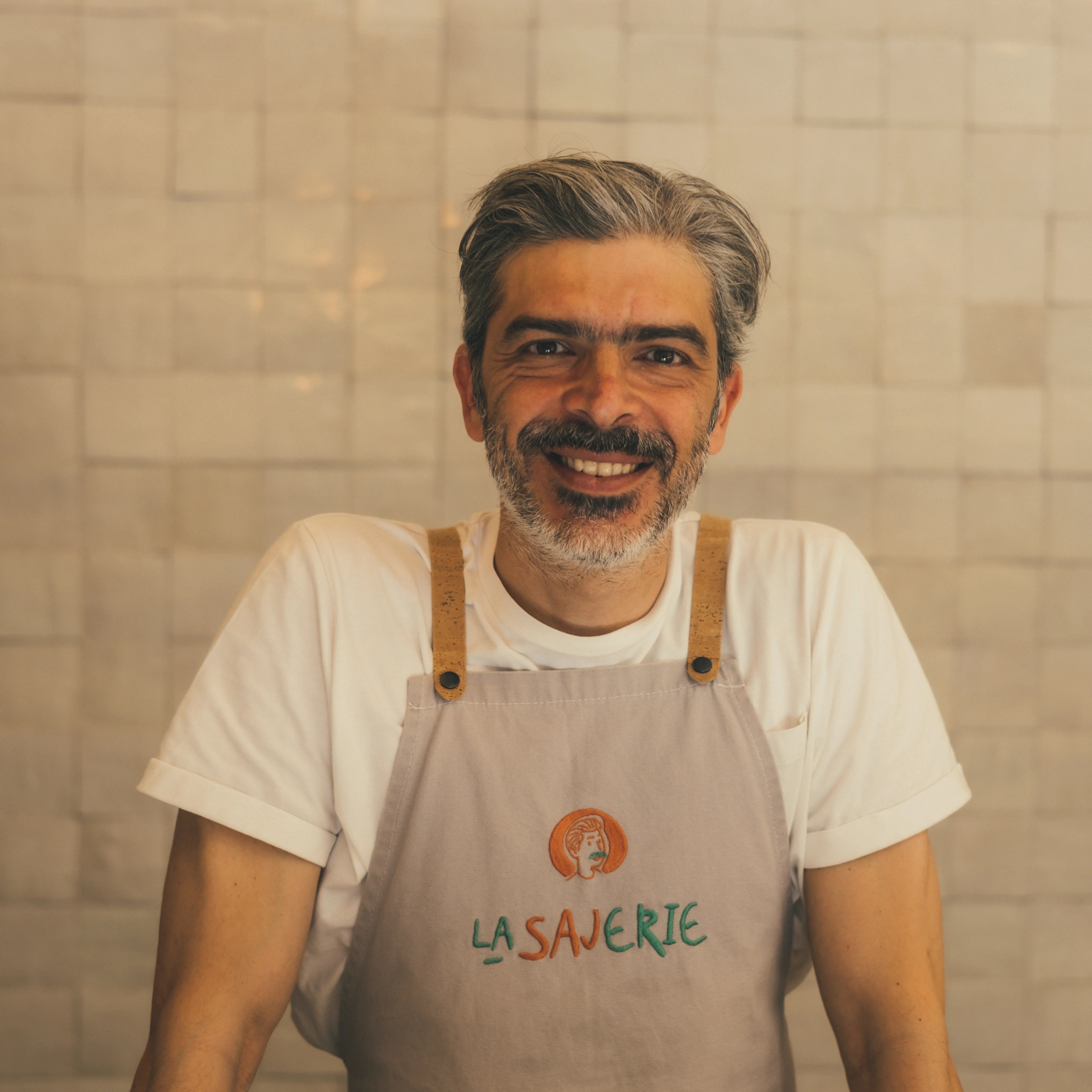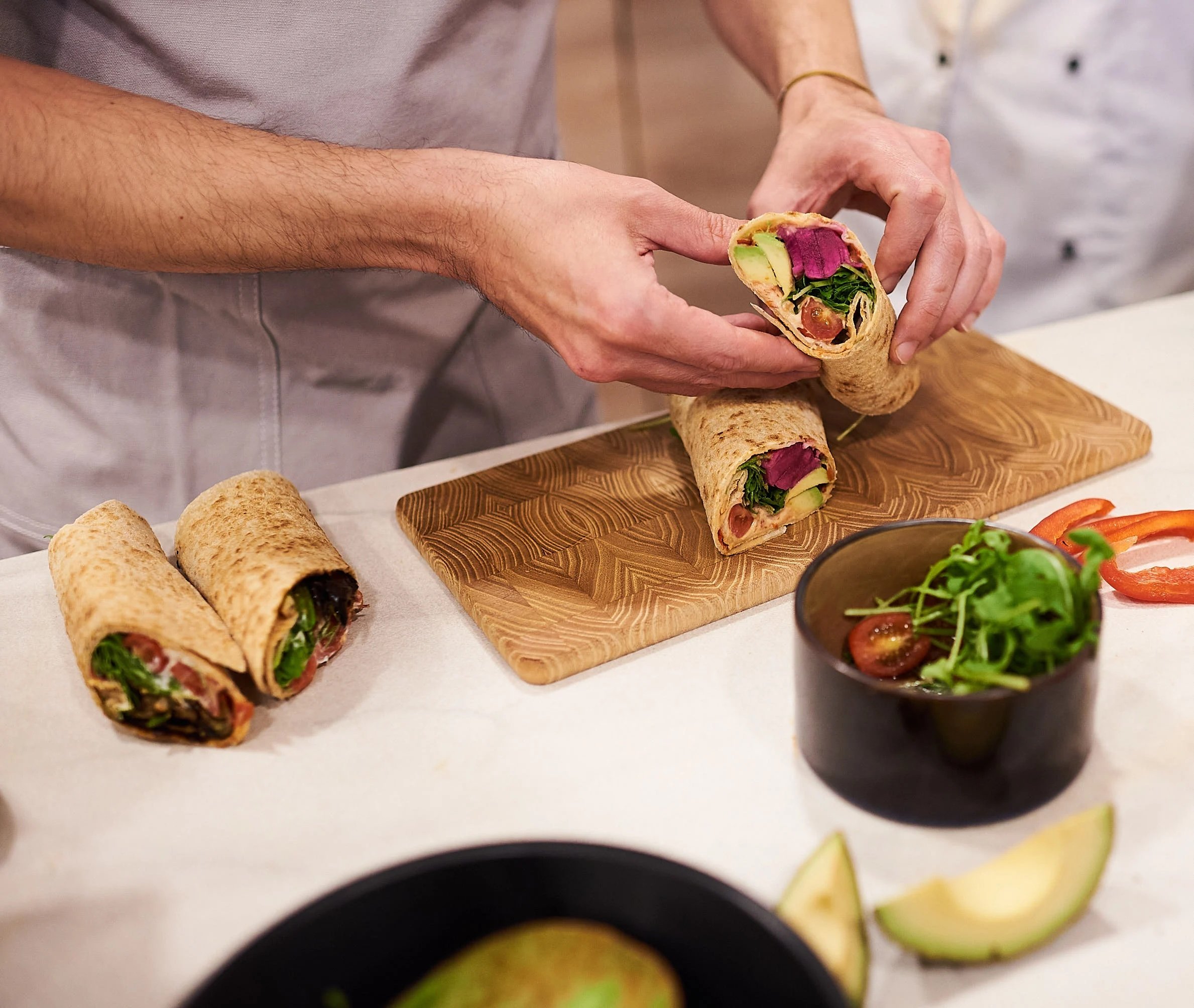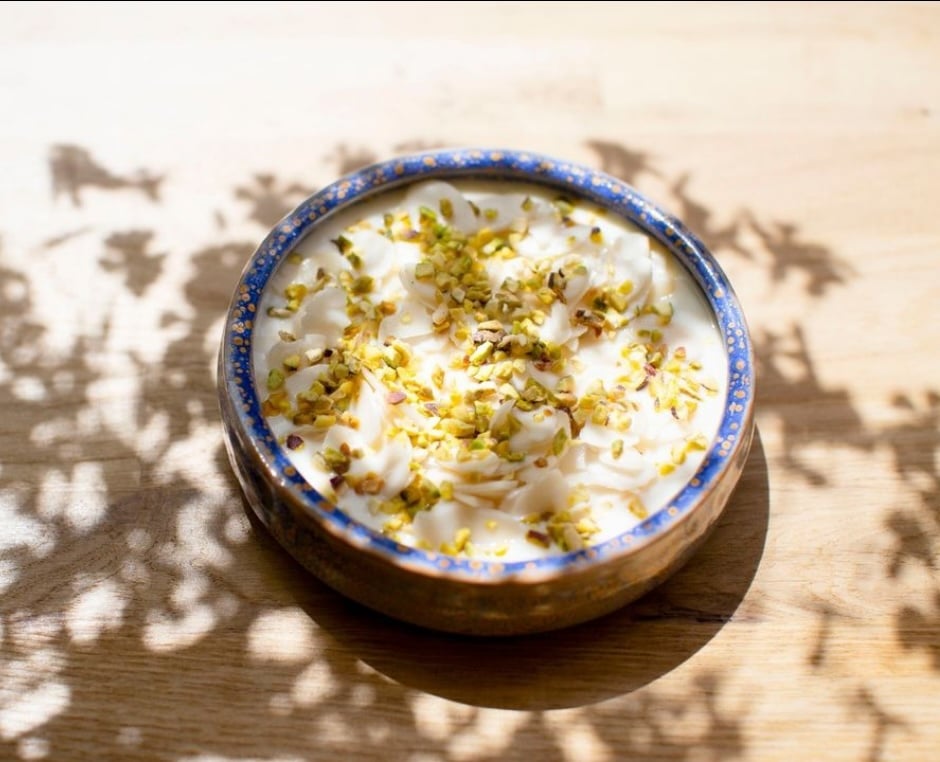
La Sajerie, a Lebanese must-see in the 9th arrondissement in Paris.
As La Sajerie bakery attracts a clientele that doubles each year, Mo Fathallah maintains a meticulous morning routine to prepare the dough that will be baked on his two sajs, a traditional, convex metal griddle used in Middle Eastern cooking to bake flatbreads, such as Arabic bread or Lebanese saj bread.
Once the kneading begins, “I can’t be interrupted,” said Fathallah, owner of La Sajerie, adding with an enigmatic smile that the recipe is a closely guarded secret.
“Everything we offer is gluten-free, and all I can say is that I use rice flour,” he added. “It took me four years to perfect it.”
 Mo Fathallah in his Sajerie, like a fish in water.
Mo Fathallah in his Sajerie, like a fish in water.
Until August 2020, Fathallah was a film producer and distributor in Lebanon.
“My grandfather founded Fathallah Films in Beirut in 1950. I was the one who distributed Khalil Gibran’s “The Prophet,” starring Salma Hayek, for example. I really enjoyed my job,” said Fathallah, whose career was abruptly disrupted by Lebanon's economic crisis in 2019.
“Our money was tied up, it became impossible to buy films, and what’s more, we lived in the city center, in the heart of the demonstrations,” he added. “My French-Lebanese wife, who had come to Lebanon a few years earlier to discover her father’s country after the death of her parents, wanted to return to Paris.”
“We prepared our move in July 2020, and then she went ahead to France,” Fathallah said.
A few days later, on Aug. 4, the Beirut port explosion happened.
“I had just left my office in the city center, which was completely blown away. There was nothing left of all our belongings, which had been stored at the port,” he recalled.
When they arrived in Paris, the couple found themselves with nothing, starting from scratch. “I didn’t know what to do. I could barely speak French, and working in the film industry was out of the question for me.”
“My wife advised me to open a restaurant and offer gluten-free creations, so I took the plunge.”
One of his childhood friends, based in Saudi Arabia, offered to help finance the project, and Fathallah location scouting, never losing his detached film-producer outlook.
“I spent months walking around the city, getting to know it better. In the end, I came across the premises on rue d’Abbeville — I had no idea it was such a fashionable area,” he said.
The couple’s friends helped with the layout and design before the opening in December 2021.
Modernizing saj
Many people have questioned the feasibility of gluten-free manouche, claiming it would not rise properly and would be too dense.
Today, Fathallah’s favorite thing is to see the joy of those who have gone without the Lebanese staple for years due to celiac disease linked to gluten intolerance.
“The sandwiches I offer can be vegan, vegetarian, or with meat. Their compositions all have links to my past,” he said. “The halloumi, avocado, tomato and spinach sandwich is reminiscent of what the mother of a friend of mine used to make for us when we were students”
He went on to say, “The chicken-toum (garlic) sandwich reminds me of the Marrouche restaurant in Beirut.”
“The combination of fried eggplants and labneh is my father’s idea; as for the Lahm Bi Ajeen [a mixture of ground beef (or lamb), veggies and spices spread on a thin dough] served with labneh, that’s an Armenian influence,” Fathallah explained.
In his small restaurant, which can accommodate around 15 customers, salads and mezzes are also available, including the artichoke, mint and pistachio salad with homemade zaatar.
 A varied menu of gluten-free saj for vegans, vegetarians and carnivores.
A varied menu of gluten-free saj for vegans, vegetarians and carnivores.
The desserts are also aligned with the latest culinary trends: The muhallabieh is vegan, the knefe is gluten-free, as are the ice cream cones for merry cream with ashta, rose, or pistachio.
“My clientele is really nice, and 90 percent French. I have regulars who come three times a week,” Fathallah said. “The traditional saj eaten at lunchtime tends to make you sleepy, but that’s not the case with rice flour. Customers appreciate the lighter aspect of the creations.”
“The muhammara that accompanies the roast eggplant is reminiscent of Syrian traditions, and the basterma and soujouk reflect Armenian influence,” he added.
Buoyed by its success, La Sajerie will soon be expanding to other locations in Paris.
“Basically, I use the same skills to produce films as I do to manage La Sajerie,” Fathallah said. “It’s about managing a budget and developing an action plan based on common sense.”
“And then when I have a question, I call my mother,” he added.
Having grown up in the city, he admits that the saj has an exotic dimension for him. So, his project is not to relive childhood memories but to modernize a heritage.
 Muhallabieh, a fresh dessert.
Muhallabieh, a fresh dessert.
“This business is the one that has given me the most satisfaction. And I’m constantly working on new recipes. At the moment, it’s gluten-free kibbeh,” he explained.
Passionate about his new project, Fathallah has not said his last word about the film industry.
“It’s in my blood and I keep a close eye on what’s going on in the film world,” he said. “If I could produce a film at the moment, I would tell a story of resilience, with the idea that you should never think it’s over; you can always start again.”
La Sajerie, 20, rue d’Abbeville, 75009 Paris
Monday to Friday: 12p.m. - 10.30p.m.
Saturday: 12pm - 3.30p.m.
This article was originally published in French in L’Orient-Le Jour. It was translated by Sahar Ghassoub.


